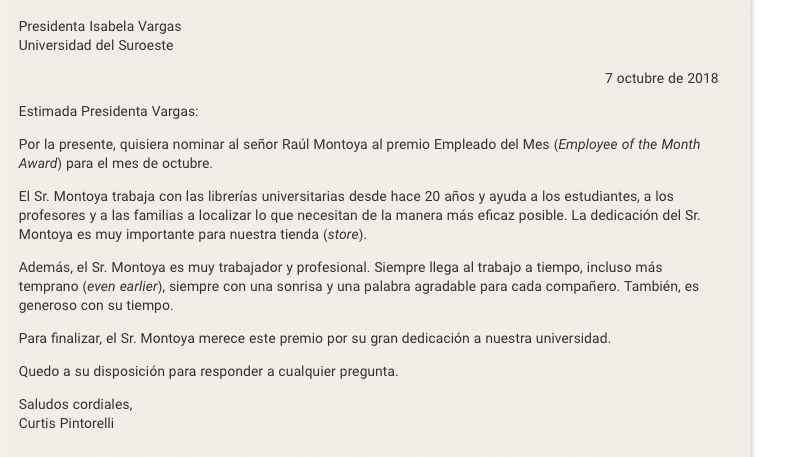An Effective Reflection Is
I have not been in a Spanish class in over 15 years. I do have some Spanish speaking friends and by being around them is the only time I have been around the language.
During this class I was able to get an understanding of the basic vocabulary and numbers. I was able to learn how to identify how to pick out words in a sentence to get an understanding of the sentence without fully not knowing the all of the sentence. By doing that I was about to get the general idea on what was taking place in a story or conversation. We had to be able to not only read Spanish, we had to listen and be able to have conversations in Spanish. The course was set up so that we were able to build on everything we learned and to be able to apply it to our conversations.
The challenge that I have is understanding the plural forms and verbs tenses of words. I am always confuse on which category a word falls under in a sentence. To get better I study and as for help from the professor and some of my Spanish speaking friends. I am getting better at it but the more help the better!
An example from Lingro Learning.

I enjoyed being able to put together the videos of how I can speak. The challenge it not only understanding what is being said to you in the video, but to know what to say back. Another think to add is that it is more of a challenge when you are making a personal video. You have to figure out what to say and not mess up your video. I would make multiple attempts to make the best video to where my Spanish sounded perfect and I was being professional at doing it.
Artifacts
Here is a video that I have learning how to pronounce certain words in Spanish. It seems easy until you press record on yourself. I must have spend over a half hour trying to perfect my pronunciations.
Instructions
Exploring Culture
In the Lingro Learning lessons we were introduced to different Spanish speaking countries and reflections of some of the people in those countries.
Reading about what some topics from the students, they were similar to us and use the same social platforms as us. I remember reading about social media and which platform was popular in which country and the age demographics of who is using what. Facebook, WhatsApp and LinkedIn. For some reason I just think that other countries do thinks differently but that is the cool part about learning about different countries and cultures is how similar we are. One thing that I was fascinated about prior to learning was that some Spanish speaking countries would have siestas that would break up their workday. After doing research, that is not fully true. Only small areas still take part of having siestas. Larger cities no longer have siestas and that is because of how fast the world operates and communicates. There would be a lot of missed opportunities for businesses if they were to have this amount of time off especially when you are communicating with people in different timezones. It is unfortunate that something like siestas has to be seen as a problem but I respect the fact that in order to be successful you must adjust with how everyone else is operating. I did not see any challenges in my perspectives when learning about the different cultures. I more so found everything interesting.
Another interesting learning topic was holidays. We saw a video on the types of holidays in Spain. San Fermín (St.Fermín) was the holiday that I liked the most. I just always associated Spain with the “Running of the Bulls”. I was unaware that this was a holiday. The festival takes place in Pamplona and the festival is a week long. A video was shown to us and it showed that there were people in the streets dressed in red, people were in puppet costumes, and the running of the bulls in the streets. It is cool to learn about this because you as the student get more details instead of just what you seen one time on TV or the internet.
Engaging in Communities
I have amazing neighbors that are from Venezuela. When ever were see each other outside we have great conversations. One day my neighbor asked me if I knew Spanish, and I said no. Once I registered for Spanish 101 I told my neighbor and he was very excited. This made me take pride in taking this class because I would love to have conversations in Spanish with him. By also doing this I get to teach my young kids how important it is to know another language. After every lesson I tell my neighbor what I learned and he will then break it down so I can have a better understanding of the language and how it is used.
Interpersonal Communication
During this semester we have a bunch of activities that helped us with the learning process of learning Spanish. We had to create videos of us talking, discussions in Spanish about a topic, listening and repeating back lessons, and voice record experiences. This was interesting because I don’t think it would be effective to learning a language by just reading. I think that listening and interactions helped me understand the language better.
Audio lesson from Lingro Learning.

Then, in a short paragraph or two, write a reflection that includes each type of the interpersonal (spontaneous, unplanned) communication activities: telecollaborative (TalkAbroad) conversations, discussion board posts, and any other interpersonal exchange. Explain how you’ve grown with each assignment/activity. What was difficult and how did you overcome that difficulty? What did you excel at and why/how? What/how did you learn from it and would you do differently next time?
Presentational Speaking
Here is a personal video that we made as part of our discussion with the professor and the students in the class. You get better making these videos as the class goes along. Personal speaking is a skill I want to improve and since a lot of companies work remotely it is great to learn the skills of making videos for your peers to see and review. In this video I had to talk about a person that I admired. We had to describe that we admired with the vocabulary that we have learned during this module period. Practice makes perfect and this is a great way to learn the pronunciation of the words. After our video is made, we then go and view our classmates videos and leave comments and ask questions.
Presentational Writing
From Lingro learning

We were were assinged different writing assignments. We had to describe people, conversations, and conduct research. One of the things that I liked from Lingro Learning was to do research on Spanish topics. The one I liked was researching a Spanish role model. I am a huge NBA fan, so I decided to research Pau Gasol. We had other topics in Lingro Learning that made us use the internet to explore what countries customs and practices. Another topic was pick a country and see what were the popular social media platform that that country used. We had some discussion about topics to research and share them with our classmates. We would also comment on their posts about what they answered. What I liked about the writing assignments was that it was a mix of different activities.
We worked within the vocabulary that we were learning. What I would recommend would some small writing actives to help teach us how to set up writing full sentences in Spanish. None of the writing was difficult, the only issues were to look up the vocabulary and review the lesson materials. One thing I would have done better is use the resources that are provided instead of just rewatching the lesson videos for help. The professor has provided a bunch of resources for us to use.
Interpretive Listening
Every module/ lesson that we were given had a listening sections attached to it. This was to help us understand how the words were being pronounced. This was also a good way to see if we can hear the key words to pick up on to get a understanding of the conversations.
Interpretive Reading
During the semester in our Lingro learning assignments we had to read abunch of different conversation styles. We would have to identify what kind of conversation it was, and other questions regarding the conversation. As the semester went on the conversations increased as well as the vocabulary.
